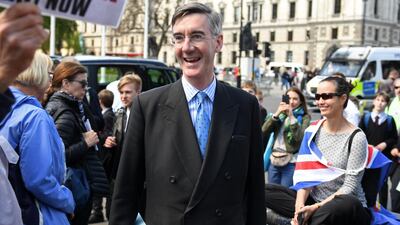Facebook has banned a British political page linked to a potential party leadership contender after a string of anti-Muslim comments were posted on it.
The unofficial Jacob Rees-Mogg Supporters Group, named after British politician Jacob Rees-Mogg, has been used to post racist material by people claiming to be members of the country’s ruling party, the Conservative Party.
The Facebook group, which has more than 24,000 members, has a peppered history of inappropriate comments being posted on the page.
In March the Conservative Party, suspended 14 of its members after a number of anti-Muslim comments were placed on it.
This week Facebook took the step of removing the group.
It follows a crackdown by the social media giant on extremist content.
The page’s namesake Mr Rees-Mogg, chair of the European Research Group, has repeatedly distanced himself from it.
Speaking about it previously, he said: “Islamophobes have no place in the Tory party and it is encouraging that we have acted swiftly unlike the Socialists."
He has not responded to requests for a comment.
The group was bought to the fore in March when it was revealed messages included calls to "get rid of all mosques" and a member who called for Muslims to be thrown off a bridge.
The party head office came under scrutiny after it was revealed two members had alerted it to the disturbing content six months earlier but no action was taken until the allegations appeared in the media.
In a statement at the time, a Conservative Party spokesperson said: “This Facebook group is in no way affiliated with the Conservative Party and many of the people identified on it are not party members.
"However we have identified some people who are party members and they have been immediately suspended, pending further investigation.
"When we find evidence of members making offensive or inappropriate comments, we consistently take decisive action. Discrimination or abuse of any kind is wrong and will not be tolerated."
Last month Facebook permanently banned a number of far-right organisations and individuals including the British National party, the English Defence League and Britain First .
In February it banned British far right extremist Tommy Robinson.
Commenting on its crackdown, Facebook said: “Individuals and organisations who spread hate, or attack or call for the exclusion of others on the basis of who they are, have no place on Facebook. Under our dangerous individuals and organisations policy, we ban those who proclaim a violent or hateful mission or are engaged in acts of hate or violence.
“The individuals and organisations we have banned violate this policy, and they will no longer be allowed a presence on Facebook or Instagram. Posts and other content which expresses praise or support for these figures and groups will also be banned. Our work against organised hate is ongoing and we will continue to review individuals, organisations, pages, groups and content against our community standards.”
It follows a move by the British government to hold social media companies responsible for removing both illegal content and content which is “legal but harmful”.
Next month Britain’s ruling party is preparing for an imminent leadership battle with Mr Rees-Mogg being a major player.
It follows the announcement by Prime Minister Theresa May that she intended to step down from the role following a vote on her Brexit deal next month.
The country’s former foreign secretary Boris Johnson has stated his intention to stand and Mr Rees-Mogg is also heavily tipped to be a contender.
Speaking on his LBC radio show, Mr Rees-Mogg said: “Boris is miles ahead of any other leader in securing the Conservative Party vote, getting votes back for the Tories. And in making us electable again he’s the first choice overwhelmingly against all the other candidates.”
In a public poll on the leadership contenders, Brexit hardliner Mr Rees-Mogg came second.


